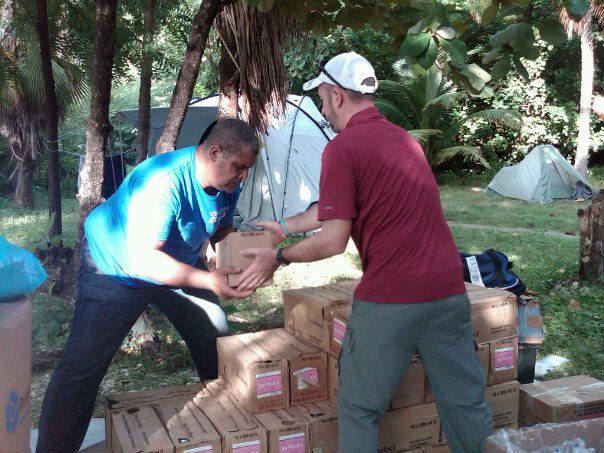
Patients suffering cholera symptoms receive treatment at the St. Nicholas hospital in Saint Marc, Haiti. After at least 20 people died when Hurricane Tomas brushed past Haiti, officials are now turning their attention back to a worsening cholera epidemic that has killed more than 500 people and hospitalized more than 7,300. –AP Photo/Ramon Espinosa
PORT-AU-PRINCE: Health officials said Monday they are examining at least 120 suspected cases of cholera in Haiti’s capital, the most significant warning sign yet that the epidemic has spread from outlying areas to threaten as many as 3 million people.
Samples from patients in Port-au-Prince are being tested in a laboratory to confirm the presence of vibrio cholera bacteria, which has already killed at least 544 people in Haiti, Health Ministry Executive Director Gabriel Timothee told the Associated Press.
If confirmed, the bacteria could imperil an estimated 2.5 million to 3 million inhabitants, nearly half of whom have been living in tents or under tarps in easily flooded encampments since their houses were destroyed in the Jan. 12 earthquake.
‘‘We are working on the cases. … We don’t have confirmation yet,’’ Timothee said.
He said many of the hospitalized patients are believed to have recently arrived from parts of Haiti such as the Artibonite Valley, where the epidemic was first registered and has done its most ferocious damage. More than 6,400 of the known 8,138 cases to date have been in the agricultural region, clustered around the Artibonite River.
At least 114 of the people suspected of having the disease in the capital are in the Cite Soleil slum, the expansive oceanside shantytown at the capital’s far northeastern edge and its closest point to the valley.
Since its discovery in late October, the disease has spread to half of Haiti’s 10 administrative regions, or departments. More than 200 people have been hospitalized in the West department, where Port-au-Prince is located, but no cases of cholera have yet been confirmed within the limits of the capital city.
Cholera had never been documented in Haiti before its appearance last month.
In little more than three weeks it is suspected of infecting tens of thousands of people, though only about a quarter of people infected normally develop symptoms of serious diarrhea, vomiting and fever. Nearly four per cent of the thousands hospitalized have died, most from extreme shock brought on by dehydration.
Officials are concerned that floods triggered by Hurricane Tomas on Friday and Saturday could exacerbate the spread of the disease, which is transmitted through the consumption of fecal matter contained in contaminated water or food. the release of a dam on the Artibonite River caused the infected waterway to swell Monday, but there were no reports of major flooding.
Living conditions in Port-au-Prince’s earthquake camps have ‘‘deteriorated as a result of the storm,’’ Boston-based Partners in Health said Monday.
‘‘Standing water, mud, lack of garbage collection, and limited sanitation availability make the camps a potential flashpoint for cholera outbreak,’’ the group said.
Humanitarian groups and Haitian health care workers have been working in Port-au-Prince to prepare for cholera, informing residents about preventative measures such as regular hand-washing and sufficiently cooking food as well as setting up clinics in expectation that the disease would spread to the city.
The origin of the outbreak continues to be a source for debate. Analysis by the US Centers for Disease Control and Prevention has found that the cholera outbreak in Haiti most closely matches a strain of the disease found in South Asia.
Public health experts, including UN Deputy Special Envoy to Haiti Paul Farmer, who co-founded Partners in Health, have called for an aggressive investigation into the origin of the outbreak.
They say that should include looking at the unconfirmed hypothesis that cholera was introduced by UN peacekeepers from Nepal, a South Asian nation where the disease is endemic. Those peacekeepers are at a UN base on a tributary of the Artibonite River, which has been found to be contaminated with cholera.
This syndicated post originally appeared at public.dawn.com/2010/11/09/cholera-epidemic-kills-at-least-544-in-haiti.html on 9 November 2010